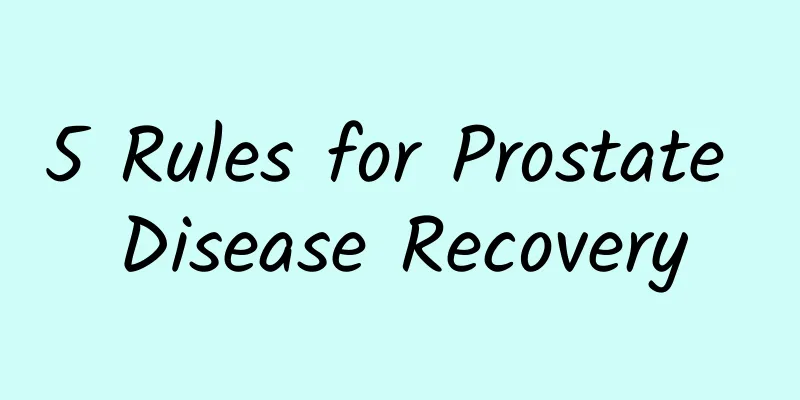5 Rules for Prostate Disease Recovery

|
First commandment: quit drinking - if you drink half a catty, your prostate will drink two ounces Experts point out that drinking alcohol can cause congestion and edema of the prostate and bladder neck, which can easily induce acute urinary retention. The following case of alcohol and prostate disease will illustrate the importance of quitting drinking for patients with prostate disease. Li Chaomin, who works as a salesperson in a factory, said: I am 40 years old this year. From 1990 to 1999, I worked as a salesperson in the factory. I often accompanied the leaders on business trips, handled affairs, and negotiated business. Therefore, drinking was a common thing. It was not uncommon to drink twice a day. On a Saturday in the fall of 1999, I got sick after drinking enough. I had a fever of 39 degrees, frequent urination, urgency, and inability to urinate. My lower abdomen was bloated and uncomfortable, and I was weak all over. I went to a hospital and was told that I had acute urethritis. I received an IV for 7 days and took medicine for a few days. But after drinking, my lower abdomen and perineum would feel vaguely swollen and uncomfortable, and urination was not smooth. But I still didn’t take it seriously and continued to drink, ride motorcycles, and do business as usual. As the saying goes, “just keep pushing the cart as long as it doesn’t fall over.” Besides, it’s just discomfort and it won’t kill me… Finally, during the Spring Festival of 2000, due to excessive drinking, I developed symptoms of frequent urination, urgent urination, and difficulty urinating, as well as abdominal distension. Someone reminded me to go to the local andrology hospital for treatment, and I was diagnosed with chronic prostatitis. During the Spring Festival this year, Mr. Chen, a patient with prostate disease, celebrated his 60th birthday with his family and friends. He drank a few more glasses during the banquet, and went to bed after seeing off the guests. In the middle of the night, Mr. Chen was awakened by the urge to urinate in his sleep, so he got up and went to the bathroom to relieve himself. Unexpectedly, he could not urinate, his lower abdomen was bloated and uncomfortable, and his perineum and testicles also felt swollen. The next day, Mr. Chen came to the hospital for treatment, and after examination, it was diagnosed as an acute attack of chronic prostatitis. The doctor said figuratively that Mr. Chen's prostate was "drunk" by alcohol. Expert answers: After drinking, alcohol is slowly absorbed and enters the bloodstream to flow to all parts of the body. The prostate is an organ that is very sensitive to alcohol. When stimulated by alcohol, it becomes excited, and local capillaries rapidly expand and become congested, causing increased fluid exudation between cell tissues and edema of cells. The higher the alcohol concentration in the blood, the more severe the prostate edema. Therefore, alcohol is very harmful to the prostate. The congested and edematous prostate will occupy more urethral space, causing difficulty in urination. When the pressure is severe, acute urine retention and inability to urinate may even occur. The swollen prostate can also compress and pull the nerve fiber endings distributed in the prostate capsule and around the prostate, causing swelling and soreness in the lower abdomen and perineum, and itching and pain in the testicles. Wine, sex, talent, the first word in the evaluation of men is wine. Men who can't drink seem to be born with a defect, but men's prostate is afraid of wine. Women don't like to drink, but women don't have prostates. God also had "ulterior motives" when creating humans. Second commandment: abstain from sexual intercourse - prostate to the left, wife to the right The prostate is the largest accessory gland in the human body. When a man has a problem with his prostate, the first thing he thinks of is sex, as if treating the disease means abstinence. However, he is making a mistake, just like controlling a flood by simply "blocking" it - prostate disease is like a flood in terms of sex life, and to control it, it requires not only "blocking" but also "draining". During the communication with prostatitis patients, more than 80% of them would ask "Should I refrain from sexual intercourse during medication treatment?" When leaving, although many patients are concerned about the relationship between treatment and sexual intercourse, they are still unclear about how to deal with it correctly. Often, they completely refrain from sexual intercourse during treatment, resulting in the abnormal phenomenon of the prostate to the left and the wife to the right. Mr. Li, male, 28 years old, married, middle school teacher, has been married for three years, and his sexual function has been normal, and his married life is good. In November last year, he felt that his sexual function had declined, not as good as before. He did not care at the time, thinking it was a psychological factor, but later it became worse and worse. So he went to the hospital for a check-up on New Year's Day and was diagnosed with chronic prostatitis. He had never thought about prostatitis and felt very confused. After each sexual life, he would feel pain in the lower abdomen, discomfort in the perineum and the root of the genitals, dizziness, and weakness. Once he found blood in the semen the next morning. All these changes made Mr. Li extremely afraid of sex, so from then on, he basically stopped having sex, and the communication with his wife also decreased significantly. He always slept with his back to his wife. His extroverted personality has become introverted, and his enthusiasm for work is not as high as before... The most troublesome thing is that Mr. Li's symptoms have not been alleviated. Later, Mr. Li went to a local andrology hospital and was asked whether his sex life was regular during this period. Only then did Mr. Li realize that his practice of not having sex was wrong. Expert Answer: It is common for patients with chronic prostatitis to be unwilling or simply prohibit themselves from having normal sexual life. The reasons can be summarized as follows: (1) Since excessive sexual activity itself is a trigger for prostatitis, patients worry that sexual activity will aggravate prostate inflammation. (2) Worrying that sexual intercourse may infect the wife. (3) Some patients experience painful penile erections and ejaculation, and therefore are subjectively unwilling to engage in sexual intercourse. (4) Some patients also have decreased sexual function, decreased penile erection hardness, premature ejaculation, etc., which make it impossible for them to have a normal sexual life. (5) Some patients hope to have healthy children and avoid sexual intercourse in order to avoid causing their wives to become pregnant during their illness. In fact, the idea that patients with chronic prostatitis strictly restrain or simply do not have sexual intercourse is biased. Because patients do not have sexual intercourse, the inflammatory prostate secretions in the patient's glandular duct cannot be discharged in time, which increases the burden on the prostate and is an important pathogenic factor in the formation of prostate stones. This will not only not help the treatment of chronic prostatitis, but will also cause the opposite effect. As long as it is not excessive, it is very beneficial for patients with prostatitis to have an appropriate sexual life to cooperate with the treatment. The third commandment: Avoid guilt - do not be ashamed to see a doctor and face prostate disease bravely Being sick is not scary, what is scary is to hide the illness and avoid seeing a doctor, and even to sin in the heart. Heart disease is often more severe than physical disease, but the patient is deeply trapped in the sense of guilt and it is difficult to detect and save himself. This certainly requires the guidance of doctors, but also requires the optimism of patients. Lu Xun said that a true warrior dares to face the miserable life. Life is like this, why not cure diseases? Prostatitis caused by mycoplasma and chlamydia is currently commonly referred to as non-gonococcal prostatitis. Mycoplasma and chlamydia infections of the prostate are mostly caused by unclean sexual behavior. Such patients are often prone to guilt for the following reasons: 1. Patients worry about being discriminated against by society and affecting family harmony; 2. Many such patients cannot afford the huge medical expenses; 3. It is difficult to cure, prone to recurrence, and prone to retrograde infection. Xiao Qian, male, 27 years old, is a migrant worker working in Shenyang. One day in August 2004, at the instigation of his companions, he went to a foot therapy city to find a prostitute after drinking. Two days later, he had frequent urination, urgent urination, and urethral discharge. He went to the pharmacy to buy some anti-inflammatory drugs and took them for three days, and felt better. Unexpectedly, 7 days later, he had frequent urination, urgent urination, swelling and pain in the lower abdomen and perineum, difficulty urinating, lack of energy, insomnia and dreaminess again. The result of the systematic examination at the hospital was: mycoplasma infection, diagnosed as non-gonococcal prostatitis. This examination cost more than 200 yuan, and the subsequent treatment costs were even higher, more than 200 yuan a day, and the total cost was more than 4,000 yuan. He was terrified. First, the non-gonococcal prostatitis he had was a sexually transmitted disease, which was too embarrassing. Second, he couldn't afford it financially. The medical bill was more than 4,000 yuan, which was equivalent to more than three months' salary if he didn't eat or drink. But there was no other way, Xiao Qian had to accept the fact. He went to a famous local men's hospital, and after a period of treatment, the mycoplasma was gone and the test results were normal. However, since he became ill, Xiao Qian has been under tremendous pressure, upset, anxious, fearful, remorseful, and in a trance. All the hard-earned money for half a year turned into medical expenses. What's more serious is that Xiaoqian suffered from non-gonococcal prostatitis, and even if it was cured at the time, it would be very easy to relapse in the future. After learning all this, Xiaoqian gave up treatment on his own initiative, left Shenyang with a guilty mood, and embarked on the road back home anxiously. After returning home, Xiaoqian was ashamed to face his simple and kind wife. He rarely had sex, and his sexual function was much worse than before, which made him even more depressed. Later, his wife became pregnant. He was very happy at first because he was going to be a father, but the guilt made him soon suspicious again. He was worried that his disease would be passed on to his wife, and then he was worried that it would affect the health of the fetus. In the end, he even began to doubt whether his wife was pregnant with his own child... Expert answer: Guilt is common in the psychology of patients with non-gonococcal prostatitis. This is understandable, but long-term guilt will undoubtedly cause harm to the patient's body and mind that is no less than the disease itself, and it also forms a huge obstacle to recovery. It is indeed a big warning for patients with prostate disease. In recent years, experts from the Shenyang Institute of Traditional Chinese Medicine Prostate Diseases have supplemented this type of patients with a special social-psychological treatment model in the clinical process to vent patients' unhealthy emotions, reduce their psychological pressure, and ultimately achieve the purpose of eliminating patients' guilt, with very good results. The fourth commandment: Avoid abusing kidney-tonifying and aphrodisiac drugs - a man's Chinese-style divorce "A man who takes supplements will be full of energy and vitality." However, it is necessary to distinguish the symptoms when strengthening the yang and nourishing the kidneys. A problem with the prostate will certainly lead to a decline in a man's sexual function, but if you ignore the prostate disease and just strengthen the yang and nourish the kidneys, it will only be counterproductive. After taking supplements, a good man will become a "patchwork". Mr. Li, 30 years old, went to a hospital in May 2004 with symptoms of decreased libido, impotence, spermatorrhea, soreness of waist and knees, insomnia and nightmares. The doctor treated him based on kidney deficiency and prescribed a kidney-warming and yang-strengthening soup. After taking it for a month, his sexual function began to improve, his libido increased, his penis erection became stronger, and each sexual intercourse could last for thirty to forty minutes. The couple's relationship returned to the warmth of their wedding day. However, two months later, Mr. Li's condition relapsed, so he took the soup medicine again for a month, and also went to the pharmacy to buy Chinese patent medicine for strengthening the kidneys. This time the effect was more obvious. Not only did the sexual intercourse last longer, but sometimes it would even repeat. Mr. Li and his wife were secretly happy, thinking that they could rest assured from now on. But the good times did not last long. Not long after, Mr. Li's old illness relapsed. Gradually, he could not even arouse basic sexual desire, and the symptoms of impotence, spermatorrhea, sore waist and knees, insomnia and dreaminess were more serious than before. His wife could understand at first, but as time went by, she slowly lost her patience, scolded Mr. Li for being useless, quarreled all day, and finally developed into a divorce. Mr. Li, who was in the prime of his life, did not understand why he had taken so many aphrodisiac and kidney-tonifying drugs until he got divorced: he ended up with impotence and sexual dysfunction, and his wife and children left him. Later, Mr. Li was introduced to the most famous andrology expert in the area. After examination, the expert found that his prostatic fluid contained 40% lecithin bodies and white blood cells were positive. In addition, Mr. Li also had symptoms such as frequent urination and perineal discomfort. It was confirmed that Mr. Li actually suffered from prostatitis, and kidney deficiency and impotence were just superficial manifestations. Expert answers: In fact, the prostate is a male accessory gland that participates in sexual activities and is closely related to sexual life. Prostate patients are often accompanied by sexual dysfunction. Some patients often present with low back pain and decreased libido as the first symptoms in the early stages. As the disease progresses, the prostate undergoes pathological changes due to long-term inflammatory stimulation and congestion, the prostate gland secretion is impaired, and the patient develops persistent impotence. Prostate disease is a primary disease, which is the root cause. Curing prostate disease is curing the root cause. For a condition like Mr. Li, once prostatitis is cured, impotence can be cured without treatment. However, if you only treat impotence without curing prostate disease, it would be putting the cart before the horse and drinking a dove to quench thirst. Most of the aphrodisiac and kidney-tonifying drugs are warm and hot, and are hard and dry in nature. Warmness promotes heat, while dryness hurts the yin. Therefore, excessive use of aphrodisiac and kidney-tonifying drugs will cause dampness and heat to accumulate, disrupt the dynamic balance of life, overdraw health, and cause the disease to become more complicated and stubborn over time. This is like a sick horse pulling a heavy cart. If you whip it and ask it to run fast, it will soon fall down. At present, the trend of aphrodisiac and kidney-tonifying drugs is very common in China. The series of health problems caused by this have caused many men to lose their virility and ultimately led to a series of Chinese-style divorce tragedies. Therefore, people with prostate disease should not abuse aphrodisiacs and kidney-tonifying drugs due to sexual dysfunction, which will make the condition worse. Men with sexual dysfunction as the first symptom should pay attention to prostate examinations to avoid blindly taking aphrodisiacs and kidney-tonifying drugs due to misdiagnosis, which will delay the condition and cause regrets... Fifth commandment: Avoid sitting for long periods of time - men who sit for long periods of time are actually sitting on their prostate Lao Zhao worked in the factory's veteran cadres department before retirement, so playing mahjong with veteran cadres became part of his job. Over time, he became more and more fond of the "Battle of Zhucheng". He played more after retirement, but the good times did not last long. Two years ago, Lao Zhao was diagnosed with chronic prostatitis and mild prostate hyperplasia. He had frequent and urgent urination and swollen perineum every two or three days. Especially when he sat for a long time, the symptoms worsened, which made Lao Zhao very annoyed. During the Spring Festival this year, on the second day of the Chinese New Year, after all the children had paid their New Year's greetings and left, Lao Zhao contacted several of his mahjong friends by phone and set up a mahjong game at Lao Zhao's house. Lao Zhao persisted at the card table for several hours, but he lost more than he won, so he always wanted to win a big hand. However, his luck was not good until the last two rounds, when he finally won two hands in a row. Especially in the last round, he won the "Piao" card, for which he focused all his attention. Before that, he had to hold his urine so hard that he had to hold it in. Finally, he won the "Piao" card by self-drawing. This time, he made up for all his previous losses, and the happiness in his heart was beyond words. However, it was very difficult for Lao Zhao to urinate. He tried hard in the bathroom for 5 or 6 minutes, but he could only urinate a little. On the morning of the third day of the Chinese New Year, the toilet was broken and he could not urinate at all. He was bloated and uncomfortable. He tried his best and sweated, but he could not urinate at all. His wife was also panicked. The couple had to take a taxi to the Shenyang Institute of Traditional Chinese Medicine for Prostate Diseases and went to the emergency room. The doctor diagnosed that the prostatitis was triggered by sitting for a long time. In the treatment room, a catheter was inserted and catheterized, which solved the urgent problem. A fellow card player learned about Lao Zhao's incident and teased him, saying: Lao Zhao, you were "in harmony with the flow" last night, but your prostate was "pinched": it was so pinched that you couldn't urinate. Expert answers: The human body generally has 4-5 liters of blood, but only about one-third of it actually flows in the blood vessels. The rest is "stored" in the liver, spleen, and subperitoneal omentum for regulation. Therefore, when a person is in a sitting position, blood tends to stagnate in the pelvic cavity. If you sit for a long time, it will cause poor circulation of the pelvic organs, congestion and edema, and produce aseptic inflammation. The prostate is the human body's accessory gland organ, located exactly in the center of the bottom of the pelvic cavity, which is exactly where blood is most likely to stagnate. Therefore, sitting for a long time is an important cause of prostate inflammation, especially if you already have prostatitis, you should be more careful not to sit for a long time. Office workers, drivers, long-term cyclists, and mahjong friends like Lao Zhao should all pay attention. Sitting for a long time is another taboo for patients with prostate disease. As the saying goes: If you talk while standing, your waist won't hurt. But if you turn it around, it seems that if you talk while sitting, your waist will hurt. Whether sitting for a long time will definitely cause waist pain is still undetermined, but men who sit for a long time will definitely have prostate pain. The location of the prostate in the human body means that it is destined to be compressed by the sitting posture. So in a sense, men who sit for a long time are not actually sitting on a chair, but sitting on their prostate. |
<<: Food strategies for men's health!
>>: The "secret recipe" for curing prostatitis lies in oneself
Recommend
What happens if there are fat particles on the foreskin?
Men's reproductive health is very important. ...
How to prevent recurrence of male breast hyperplasia surgery
Some people are very worried about the recurrence...
How to treat male erectile dysfunction in the early stage?
When it comes to genital warts, I believe everyon...
There are small white spots under the glans
Some men find white dots under their glans when t...
How to reduce belly fat for men
When male friends enter the workplace, the most c...
What are the symptoms of male appendicitis?
In most people's minds, the coccyx is dispens...
What are the harms of ejaculation outside the body
Historically, the contraceptive method of externa...
Sex life becomes soft
Men feel fatigued in the middle of sexual interco...
What does a man's sperm look like under normal circumstances?
Healthy sperm and healthy eggs combine to form a ...
Is spermatorrhea considered ejaculation? Is spermatorrhea the same as ejaculation?
Strictly speaking, it is considered as ejaculatio...
What are male diseases?
In our impression, men are always synonymous with...
What are the tips for men to prevent sexual aging?
Men are the backbone of society, and their role i...
My boyfriend is rubbing his head outside
When men and women date for a period of time, as ...
Urinating sperm-like fluid
Men with prostatitis need to be treated immediate...
Low blood pressure during dialysis: three reasons you need to know
Hemodialysis is a common method for treating some...









